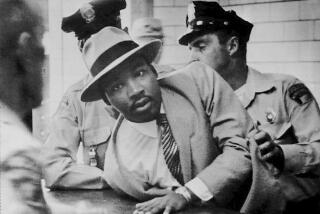King David’s Life of Contradictions Holds Fascination
- Share via
David ben-Jesse, king of Judah, then king of all Israel, is enjoying a renaissance in contemporary literature, both scholarly and popular. Several books by important authors have appeared recently and more are on their way. The latest, “King David,” by Jonathan Kirsch, occupies middle ground between the more esoteric and the more exoteric, between the highly technical and the more overtly simple, and bids fair to become the favorite portrait of the most-favored son in the biblical tradition and also the best-selling life of King David in present company.
Kirsch, the author of previous books on the Bible, including “Moses: A Life” and “The Harlot By the Side of the Road,” has written an eminently reasonable and readable account of perhaps the best-known and most popular of all the biblical heroes. While sharing the limelight with the ancestral patriarchs and the towering figure of Moses, the traditional founder and law-giver of the nation, David emerges from the shadows of legend and myth into the full glare of history. In the current battle between the so-called minimalists and maximalists, Kirsch stands firmly to the right of center, which is where the bulk of serious scholarship is located, supported by recent archeological finds and rational reconstruction of available data. He has retold this very dramatic, suspenseful tale exceedingly well. For most readers, this version of the King David story will serve to frame and enrich their understanding of the biblical account. And for those who may wish to explore further the biblical terrain and deal more directly with issues, problems and controversies, Kirsch has provided sources and resources of value.
In addition to narrating David’s life, from his rise in the time of the prophet Samuel and King Saul to his death after the accession of his young son and heir, Solomon, Kirsch traces the history of the House of David, which occupied the throne of Judah for more than 400 years. As with other modern commentators, Kirsch handles the data realistically and doesn’t blink at the flaws in David’s character or his notorious misdeeds and chicanery. He also presents a very attractive personality who inspired love and loyalty in multitudes, men and women alike. Kirsch also suggests that David and his story share several things in common with another great figure: the legendary King Arthur of early English tradition.
The familiar story of the shepherd boy who became king of his nation is irresistible and related magnificently in the Hebrew Bible. The language and narrative style are a high point in the literary history of Israel. The episodes themselves are mostly realistic, and it is only the unusual combination of events and circumstances that produces the spectacular success of his life and career. A straightforward narration can relate all or nearly all of the achievements and attainments of this remarkable person, without appeal to the miraculous or to direct divine intervention. Though religion is powerful and pervasive in ancient Israel, as in all contemporary societies, Yahweh, the God of Israel and the cosmos, does not intrude personally in the human scene, but operates at a distance and through human agencies, giving the story a modern spin and patina.
The main interest for Kirsch and other modern authors is the interaction of human beings on the scene and the interplay of dynamic factors, producing a saga of extremes in human behavior: violence, bloodshed and lust on one side and love, loyalty and peace on the other; a story of treachery and betrayal balanced by constancy and devotion beyond any call of duty. At the swirling vortex of this vast turmoil is the man himself, a seething bundle of contradictions: “a man of blood” (“a bloodstained field of hell” in Kirsch’s book), a confessed adulterer and murderer (a determined consecutive violator of the commandments); at the same time, the pious poet-laureate of Israel and the creator of the liturgy for the Temple.
In any investigation into ancient history, errors inevitably arise. Some dates and references that Kirsch trusts, such as those about the circumstances surrounding the division between Israel and Judah, are under considerable ongoing academic debate. Yet “King David” is a splendid biography of the founder of an enduring dynasty, builder of the capital city of the kingdom, Jerusalem, and ancestor of the Messiah in Jewish and Christian tradition. One could say that the field is somewhat crowded just now with studies of the life of David, but Kirsch’s “King David” proves that there is always room for a new treatment offering insights into this complex and often enigmatic figure.
*
David Noel Freedman is the author, most recently, of “The Nine Commandments” and is general editor of the Anchor Bible Project (which includes the commentary series, dictionary and reference library).
More to Read
Sign up for our Book Club newsletter
Get the latest news, events and more from the Los Angeles Times Book Club, and help us get L.A. reading and talking.
You may occasionally receive promotional content from the Los Angeles Times.










